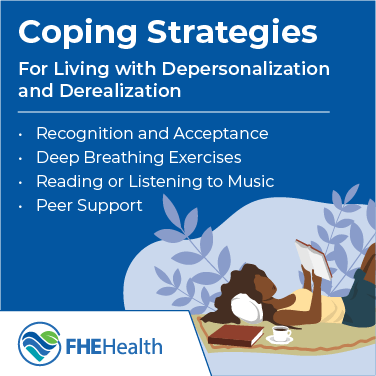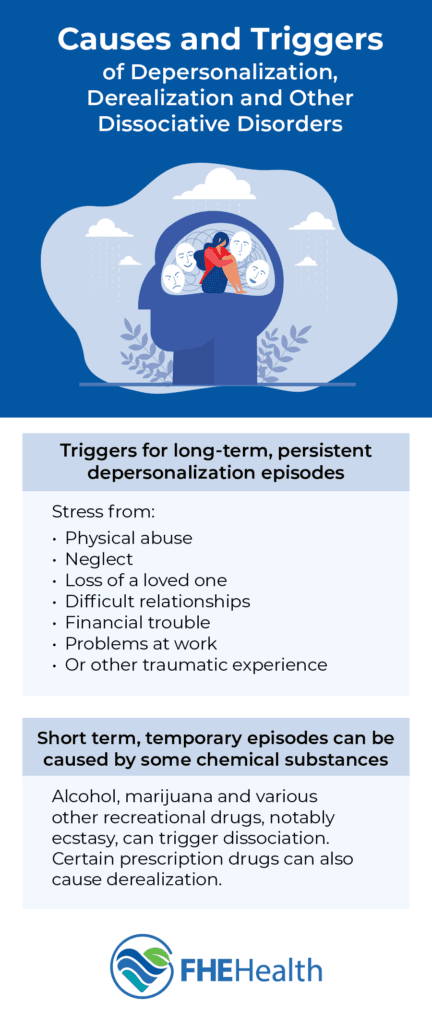
Depersonalization is a common condition that may affect up to 2% of the population. It’s generally associated with stress, trauma, anxiety, and other emotional disorders, and treating it can make a world of difference in people’s quality of life. Depersonalization, together with derealization, are dissociative conditions you should understand better if you’re battling these persistent mental health issues.
What Are Depersonalization and Derealization?
 Depersonalization and derealization are superficially similar conditions, and they can have similar causes, but people tend to experience them differently. Both cause a sense of disconnection from the real world, but they differ in their focus. Depersonalization is usually used to describe the feeling of being disconnected from the self, while derealization usually refers to a similar dissociation from the outside world. Both are experienced as a feeling of separation from either the world or personal identity, and either can be felt on its own or together with the other. These senses may be temporary and mild, or they can be persistent and severe.
Depersonalization and derealization are superficially similar conditions, and they can have similar causes, but people tend to experience them differently. Both cause a sense of disconnection from the real world, but they differ in their focus. Depersonalization is usually used to describe the feeling of being disconnected from the self, while derealization usually refers to a similar dissociation from the outside world. Both are experienced as a feeling of separation from either the world or personal identity, and either can be felt on its own or together with the other. These senses may be temporary and mild, or they can be persistent and severe.
People living with this kind of perception disorder often describe feeling emotional detachment from themselves or other people or events taking place around them. Both conditions can cause or worsen alienation from loved ones, loss of work, or the inability to function independently without help. While some loss of self-awareness or feelings of detachment are normal for most people from time to time, depersonalization and derealization become serious dissociative disorders when they interfere with activities of a normal life.
What Causes Depersonalization, Derealization, or Other Dissociative Disorders?
Depersonalization and derealization have similar causes, usually connected with some form of trauma. Stress from physical abuse, neglect, loss of a loved one, or another traumatic experience can be the trigger for long-term, persistent depersonalization episodes. Other stressors, such as difficult relationships, financial trouble, or problems at work, have also been known to trigger depersonalization and derealization incidents.
In the short term, temporary episodes of both depersonalization and derealization can be caused by some chemical substances. Alcohol, marijuana, and various other recreational drugs, notably ecstasy, can trigger dissociation. Certain prescription drugs can also cause derealization, often psychotropic medications like Thorazine or Haldol. When dissociation is caused by medications or other short-term conditions, it’s usually passing and may go away when the immediate cause is removed.
Related Disorders and Substance Abuse
Depersonalization and derealization can occur alongside other, related disorders. People with anxiety, depression, PTSD, or various types of cognitive impairment may describe a feeling of unreality from time to time. These may be regular symptoms a person experiences frequently with the other symptoms of their disorders, or they can stand alone as a separate issue.
Dissociative disorders like these can also be the symptoms of substance abuse disorder. Short-term use of recreational drugs can cause depersonalization or derealization as part of their immediate effects and then wear off as the drugs leave the body. They can also develop as persistent conditions caused by long-term drug abuse, in which case the symptoms tend to occur independently of whether the person is currently using narcotics.
Treatment Options for Depersonalization
There’s no medical treatment for depersonalization or derealization on their own, but various approaches can help many people manage dissociation and other unpleasant symptoms of these conditions. As a rule, dissociative symptoms can be treated on their own with psychotherapy, which mostly consists of talking sessions with a psychologist or licensed clinical social worker. Cognitive behavioral therapy (CBT) and Eye movement desensitization and reprocessing (EMDR) are both favored approaches to treating both depersonalization and derealization .
Another avenue for treatment is to address the underlying conditions that cause derealization and depersonalization. This can be complicated work because so many conditions cause these symptoms and correctly diagnosing them may be a challenge. If the dissociation is connected with drug abuse, treatment probably starts with detox and sobriety therapy, after which the episodes may subside. For other causes, such as anxiety and depression, medical options can help reduce stress and improve the person’s ability to function. When the dissociation is the result of past trauma, such as childhood abuse or the loss of a loved one, it’s common to set up a combination approach to therapy that includes talk therapy and possibly medications to address the underlying trauma that causes depersonalization.
Coping With Depersonalization and Derealization
People living with regular bouts of depersonalization or derealization can experience a serious decline in their standard of living. While a few short episodes of dissociation from time to time don’t necessarily call for a commitment to mental health treatment, it can still be disturbing and unpleasant. Fortunately, a number of coping strategies exist that many people use to help them get through temporary bouts.
Recognition and Acceptance
One of the most distressing things about depersonalization is how alien it can feel while it’s happening. Instead of letting a minor bout of dissociative feelings blow up into an hours-long session that interferes with your activities, you can develop strategies to recognize when depersonalization or derealization is starting. Remind yourself that this happens sometimes, that it’s not cause for alarm, and that you’ll get through it. Coping strategies based on recognition and acceptance are common in CBT.
Deep Breathing Exercises
Dissociation is often a reaction to stress, so anything that lowers stress levels can potentially help. Develop a series of deep-breathing and meditation exercises that can help you let go of your stress and relax when you feel a bout of depersonalization starting.
Reading or Listening to Music
Similar to meditation, many people find relaxation in a book or music they like. The purpose of taking a break and reading or playing music is to lower stress and reduce the severity of depersonalization episodes. Turn to whatever it is that relaxes you as a coping strategy. If reading and music don’t do it, you can work out, go for a walk, head out to the garden, or play video games.
Peer Support
It helps a lot of people to talk through their symptoms with a sympathetic friend. If there’s somebody in your life who can hear you out and talk with you during a bout of depersonalization, you may find the episodes less challenging to deal with and less distressing to handle on your own.
Help for Dissociative Disorders Is Available
Whatever is causing your depersonalization or derealization disorder, and however you’ve been trying to cope with it, know that you don’t have to face it by yourself. The care team at FHE is available 24/7 to help you work through your dissociative disorder with evidence-based approaches to compassionate treatment. Contact us today to find the help you need.







